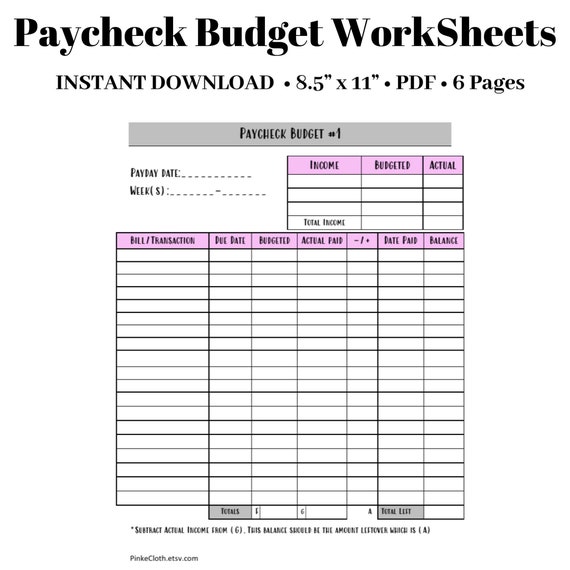In today’s fast-paced world, managing your finances has become more important than ever. One crucial aspect of financial management is budgeting. While budgeting can be challenging, especially when you are paid every two weeks, there are several strategies that can help you stay on top of your finances.
- Understand Your Income and Expenses
 The first step in budgeting when paid every two weeks is understanding your income and expenses. Start by identifying all your sources of income, including your regular paycheck. Then, list all your monthly expenses, such as rent, utilities, groceries, transportation, and debt payments. This will give you a clear picture of how much money you have coming in and going out each month.
The first step in budgeting when paid every two weeks is understanding your income and expenses. Start by identifying all your sources of income, including your regular paycheck. Then, list all your monthly expenses, such as rent, utilities, groceries, transportation, and debt payments. This will give you a clear picture of how much money you have coming in and going out each month.
- Create a Budget
 Once you have a clear understanding of your income and expenses, it’s time to create a budget. Divide your expenses into categories and allocate a portion of your income to each category. This will help you prioritize your spending and ensure that you are not overspending in any area. Consider using budgeting worksheets or online tools to make the process easier.
Once you have a clear understanding of your income and expenses, it’s time to create a budget. Divide your expenses into categories and allocate a portion of your income to each category. This will help you prioritize your spending and ensure that you are not overspending in any area. Consider using budgeting worksheets or online tools to make the process easier.
- Set Financial Goals
 In addition to creating a budget, it’s essential to set financial goals. These goals will help you stay motivated and focused on your long-term financial success. Whether it’s saving for a down payment on a house, paying off debt, or building an emergency fund, having clear financial goals can guide your budgeting decisions.
In addition to creating a budget, it’s essential to set financial goals. These goals will help you stay motivated and focused on your long-term financial success. Whether it’s saving for a down payment on a house, paying off debt, or building an emergency fund, having clear financial goals can guide your budgeting decisions.
- Track Your Expenses
 To ensure that you stick to your budget, it’s crucial to track your expenses regularly. Keep a record of all your spending, either through a mobile app or a simple spreadsheet. This will help you identify areas where you may be overspending and make adjustments as needed.
To ensure that you stick to your budget, it’s crucial to track your expenses regularly. Keep a record of all your spending, either through a mobile app or a simple spreadsheet. This will help you identify areas where you may be overspending and make adjustments as needed.
- Pay Yourself First
 One effective budgeting technique when paid every two weeks is to pay yourself first. Set aside a portion of each paycheck to save or invest before allocating money to your expenses. By prioritizing savings, you can build an emergency fund and work towards your long-term financial goals.
One effective budgeting technique when paid every two weeks is to pay yourself first. Set aside a portion of each paycheck to save or invest before allocating money to your expenses. By prioritizing savings, you can build an emergency fund and work towards your long-term financial goals.
- Utilize the Envelope System
 The envelope system is a popular budgeting method that can be especially useful when paid every two weeks. Divide your cash into different envelopes, each representing a specific spending category. This way, you can visually track how much money you have left for each expense and avoid overspending.
The envelope system is a popular budgeting method that can be especially useful when paid every two weeks. Divide your cash into different envelopes, each representing a specific spending category. This way, you can visually track how much money you have left for each expense and avoid overspending.
- Plan for Irregular Expenses
 When creating your budget, don’t forget to account for irregular expenses, such as car maintenance, healthcare costs, or annual subscriptions. Set aside a small amount each month in a separate category to cover these expenses when they arise. This way, you won’t be caught off guard and can avoid relying on credit cards or loans.
When creating your budget, don’t forget to account for irregular expenses, such as car maintenance, healthcare costs, or annual subscriptions. Set aside a small amount each month in a separate category to cover these expenses when they arise. This way, you won’t be caught off guard and can avoid relying on credit cards or loans.
- Review and Adjust Your Budget Regularly
 Finally, remember that budgeting is an ongoing process. It’s essential to review and adjust your budget regularly based on changes in your income or expenses. Life circumstances can change, and your budget should reflect those changes to ensure you are always in control of your finances.
Finally, remember that budgeting is an ongoing process. It’s essential to review and adjust your budget regularly based on changes in your income or expenses. Life circumstances can change, and your budget should reflect those changes to ensure you are always in control of your finances.
By following these budgeting tips and staying disciplined, you can effectively manage your finances, even when paid every two weeks. With a solid budget in place, you can save money, pay off debt, and work towards your financial goals with confidence.